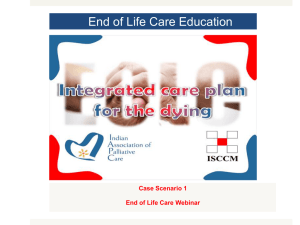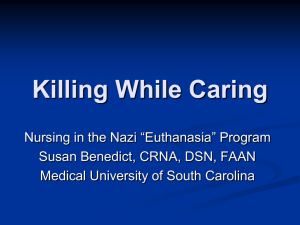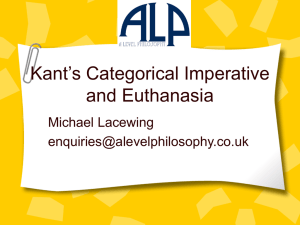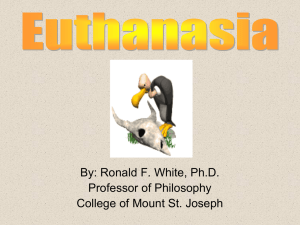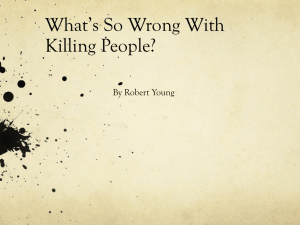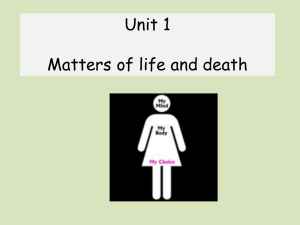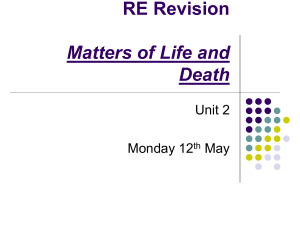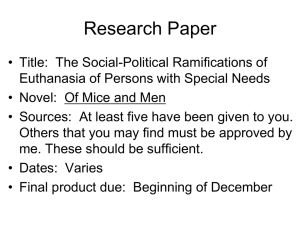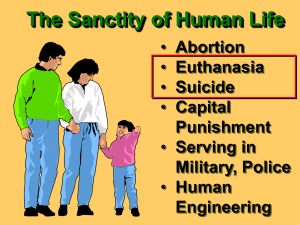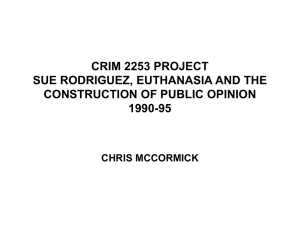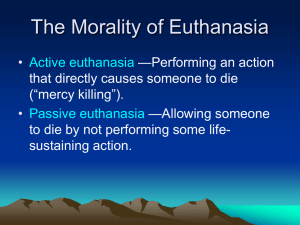Euthanasia
advertisement
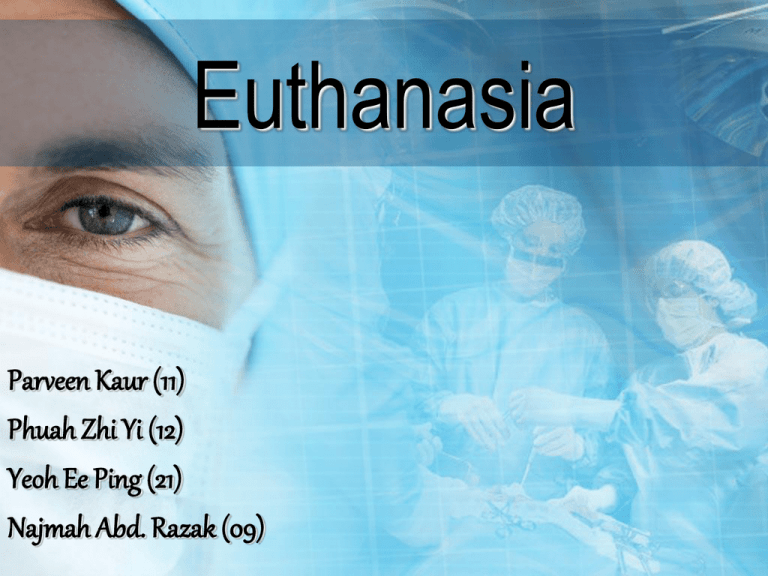
Euthanasia Parveen Kaur (11) Phuah Zhi Yi (12) Yeoh Ee Ping (21) Najmah Abd. Razak (09) What is Euthanasia? • Practice of the painless killing of someone who is suffering a painful illness that cannot be cured or someone who is very old • Omission of a dependent human being for his/her alleged benefit • Simply, it can be known as mercy killing in laymen’s term 4 types of Euthanasia Voluntary and direct: Chosen and carried out with patient’s request Voluntary but indirect: Decision had been chosen in advance by the patient before any complications happens. If something goes wrong, and they become terminally, the decision on whether to let them live or die would be up to their advanced agreement 4 types of Euthanasia Direct but in voluntary: Done for the patient without his/her request Indirect and involuntary: The hospital decides whether it is time to remove life support from the patient because they feel that the patient has no more or little chance of surviving What is the main issue with euthanasia? There are always two sides to a debate; People who feel that lives of human-beings cannot be taken away because it is unethical and immoral will take a pro-life stand Pro-life 1. Devalues human life. 2. Can become a means of healthcare costs containment. 3. Physicians and other medical care people should not be involved in directly causing death. 4. “Slippery Slope” effect that has occurred where euthanasia has been first legalised for only the terminally ill. Now, laws are changed to allow it for other people or to be done non-voluntarily. What is the main issue with euthanasia? There are always two sides to a debate; People who feel that freedom of choice is being oppressed will take a pro-choice stand Pro-choice 1. Provides a way to relieve extreme pain. 2. Provides a way of relief when the person’s quality of life is low. 3. Frees up medical funds to help other people. 4. Freedom of choice. Ethical Issues of Euthanasia • Religious groups find it outrageous for people to kill themselves just because they find it hard to live • Perseverance is key (God only helps those who help themselves) • Religious parties believe that life is precious and is given by God, therefore only God should determine when it is time for us to die Why forbid Euthanasia? Fear of the misuse/abuse of Euthanasia in future • Patients are killed although they did not choose to die • Fear of people using Euthanasia to end their lives deliberately without good reason Fact: In the UK, killing a person with any form is considered murder. PRO-CHOICE Countries in which assisted suicide or euthanasia are legal: Netherlands (Green), Belgium (Red), Oregon and Washington (Yellow) Provides a way to relieve extreme pain: • Argue that a civilized society should be allowed to die with dignity and without pain • Allow others to assist in euthanasia PRO-CHOICE Provides a way of relief when the person’s quality of life is low • People who have a low quality of life should be given the rights to end their life • They should not be forced to stay alive and suffer because it is inhumane and cruel • Making people go on to live suffering, violates a person’s freedom of rights Euthanasia and Suicide HOWEVER • There is a difference between Euthanasia and suicide • Some religions allow the use of Euthanasia as it helps one relieve the pain of incurable illnesses (belief that it is no use making a person live when we already know that no hope is left) • Suicide is the deliberate killing of one’s-self Singapore’s View on Euthanasia (People) • Many still believe in living to the fullest of life • Only about 10,000 have signed on to the Advance Medical Directive Act (AMD) instilled in 1996, to indicate that they will not want to be subjected to any special life-support when they are already dying • Many avoid talking about death (taboo) • However there is no right or wrong in the issue. Singapore’s Decision (Governmental) • To allow or to disallow, Euthanasia still remains as question mark in Singapore. • Debates are still on going about this controversial issue which touches on morals and determines life and death Singapore, an ageing population • By 2030, one in five Singaporeans will reach 60 years • Majority will face terminal illnesses at some point which even modern technology may not be able to guarantee cure but only reduce the symptoms • With Singaporeans feeling that there is no right or wrong, many remain as fencesitters: They are not 100% sure that there is no more value to their life anymore Acknowledgement • http://www.worldfaiths.com/GCSE%20Short%20course/euthanasia.J PG • http://www.lifeissues.net/writers/pol/pol_01euthimpa ctfamily.html • http://www.bbc.co.uk/ethics/euthanasia/ • http://www.hsc.usc.edu/~mbernste/ethics.euthanasi a.html • http://blogs.straitstimes.com/2008/12/12/the-greateuthanasia-debate • http://www.euthanasia.com/proscons.html
